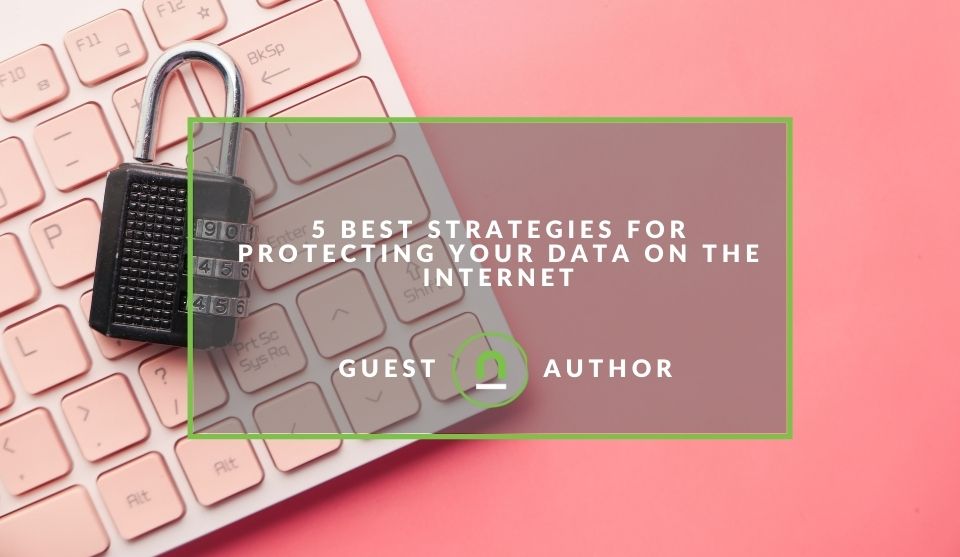Recent posts

Money Talks
XRP vs. Stablecoins: Which Is Better for Cross-Border Payments in 2026?
28 January 2026

Press Releases
Sleep Expert Cautioning Against TikTok’s ‘Mouth Taping’ Trend
28 January 2026

Press Releases
Why Vintage Watches Are the Hottest Trend in 2026
27 January 2026

Press Releases
Africaworks Accelerates The Rollout Of Real Estate Investment Platform
20 January 2026
Popular posts
Extravaganza
Trending Music Hashtags To Get Your Posts Noticed
24 August 2018
Geek Chic
How To Fix iPhone/iPad Only Charging In Certain Positions
05 July 2020
Extravaganza
Trending Wedding Hashtags To Get Your Posts Noticed
18 September 2018
Money Talks
How To Find Coupons & Vouchers Online In South Africa
28 March 2019
5 Best Strategies for Protecting Your Data on the Internet
23 March 2022 | 0 comments | Posted by Fran Villalba Segarra in Alarming
The internet is the new, new frontier - a virtual wild, wild west. As the world works to bring civilisation online, many information bandits have decided to take advantage of the internet's lawlessness. If you're not careful out there in the big-wide-web, you can easily find yourself a victim of a data robbery.
The internet is full of amazing places filled with unbelievably useful and beautiful information, but it is also filled with trolls, hackers, and bad guys, looking to make money off of your personal information.
Protect yourself in the virtual wilderness by using these five strategies listed below:
Create strong passwords
Nowadays, pretty much every web page asks you to create a user's account, and it can be hard to keep track of what login information is for what site. All of us are tempted to use the same password over and over again. Don't do it!
If your Netflix, Facebook, or any other random account passwords are the same as your bank, utilities, and medical services logins, then you're in for a world of hurt if a hacker gets into a single account. Not all accounts are protected as well as others. If you use the same information for all accounts, your security is only as strong as the weakest website you signed into.
Make it a habit to use different passwords for all of your accounts and avoid easy-to-guess passwords that use personal information, like your birth date and such. With everything being on social media, including basic information makes it easy for people who know what they're doing to hack you. Instead, think of something original and important for you that's completely unpredictable for others.
Also, pay attention to the length of your passwords. Passwords approximately 12-16 different digits in length are considered to be safe enough. Be sure to always include numbers, lower and upper-case letters, and special characters like >, !, or @. If it's hard to think of something that meets these requirements, use a trusted password generator.
Long and difficult passwords can be hard to remember, so it's smart to use a password manager. A password manager will help you to safely store all of your various passwords without you having to write them all down in your notebook, on a sticky note, or asking your partner to memorise them for you.
Update privacy settings
With all the scandals being uncovered regarding companies' sharing or selling your private information on your behaviour and digital habits, it's more important now than ever to check and update your privacy settings.
As shady as some companies may be, most device manufacturers do include native privacy features; the thing is, most of these settings are not turned on by default. Go into your computer and phone settings and keep an out for any sections labelled "privacy".
From there, you can usually adjust which apps have access to certain data, and you can also turn off permission to things like your microphone and camera. Take the time to turn off any automatic updates and enable a Firewall as well. You may also be able to change your settings to prevent the displaying of your personal data publicly.
All devices and operating systems are different, so really explore your general and systems setting to see what options your specific device has to enhance its security.
Use trusted security services
You don't have to protect your privacy alone. There are tons of services designed to help better protect users' privacy and information.
First off, you should always run a VPN (Virtual Private Network) which hides your IP address and makes it more difficult for hackers and corporations to access your browsing data. VPNs are especially important when connecting to public or untrusted wi-fi services.
A good ad blocker and antivirus software are good additions to also pick up. Just be careful to make sure you choose a legitimate company with a solid track record of keeping users' information safe.
Also, how you share and store files online can leave your information open to prying parties. When backing up and storing your files, choose a safe and secure cloud service storage. Many of the free cloud services offered by Big Tech companies will use your data in some way or another to generate revenue through the sale of information or ad space.
Newer modern cloud services, a good example being Internxt, encrypt your data before it leaves your device, and even the provider of these services is unable to access your data. Basically, what you want to keep private, stays private.
Share information sparingly
Slow down when opening a new account and always read the terms and services disclaimer. Often we move quickly online and put our data in harm's way without giving it a second thought. A 5% discount is not worth forking over your payment information and birth date.
Be careful what you post on social media; anyone monitoring your account may be able to use information from your posts to access your accounts by guessing obvious passwords or answering simple security questions.
When sharing files, make sure you trust who you're sending them to and limit the number of shares you allow. A couple of cloud-sharing services allow you to specify how many times a document is shared. This is super helpful because you don't know who you share your doc with will share it with next.
And, of course, you don't want unflattering pictures of yourself floating around the internet, so just be careful what you put out there.
Be smart and click carefully
Links are like dark water; you don't know what is under the surface until you jump in headfirst. Use good judgment when deciding to click a link. Make sure it's from a verifiable source and that it's absolutely necessary for you to open the link before doing so.
Be careful what websites you click on. Some websites are less than honourable when it comes to taking care of their visitors. Certain sites may be filled with dangerous ads and tons and privacy loopholes, through which cybercriminals may sneak malware through.
Be safe out there!
These are just a few strategies to keep you safe online. But remember, you are not alone in a fight to protect your personal data. There are tons of well-meaning organisations and ethics-conscious companies working to create a safer and more responsible World-Wide-Web.
About the author
Fran Villalba Segarra is the CEO of Internxt - the world's most secure cloud storage. Since 2020 he has been working hard to create powerful tools for a safer and more private internet that respects its users. Feel free to connect with Fran on Linkedin.
Tell us your story
Would you like to write for nichemarket just like Fran has? Find out how to submit a guest post and when you're ready, you can contact us.
Are you looking to promote your business?
South African Business owners can create your free business listing on nichemarket. The more information you provide about your business, the easier it will be for your customers to find you online. Registering with nichemarket is easy; all you will need to do is head over to our sign up form and follow the instructions.
If you require a more detailed guide on how to create your profile or your listing, then we highly recommend you check out the following articles.
Recommended reading
If you enjoyed this post and have a little extra time to dive deeper down the rabbit hole, why not check out the following posts on web security.
You might also like
Sleep Expert Cautioning Against TikTok’s ‘Mouth Taping’ Trend
28 January 2026
Posted by Steph M in Press Releases
Sleep expert warns that the viral mouth taping trend flooding TikTok could pose serious risks for people with undiagnosed sleep apnea and other sleep...
Read moreWhy Vintage Watches Are the Hottest Trend in 2026
27 January 2026
Posted by Phoebe B in Press Releases
Jewellery expert reveals why vintage watches are the hottest trend in 2026 and how to care for them while you build your watch collection
Read more{{comment.sUserName}}
{{comment.iDayLastEdit}} day ago
{{comment.iDayLastEdit}} days ago
 {{blogcategory.sCategoryName}}
{{blogcategory.sCategoryName}}
